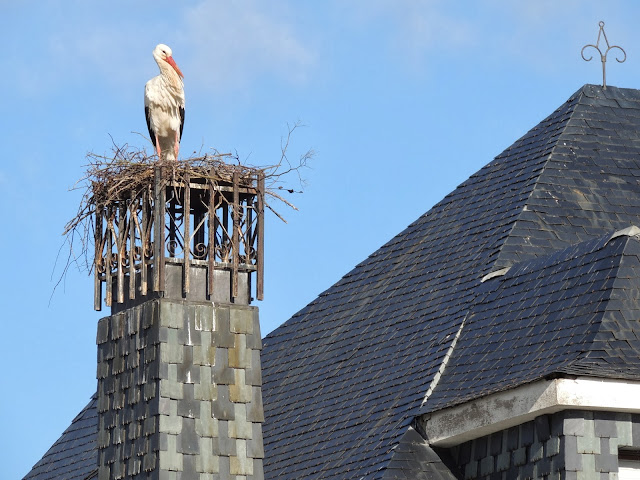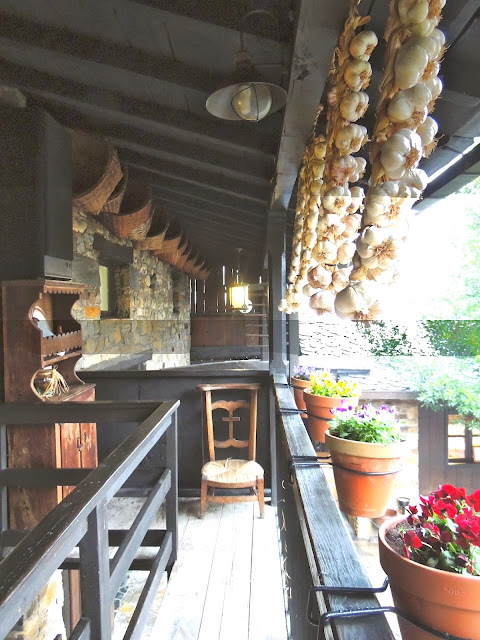«Por san Blas la cigüeña verás, y si no la vieres: año de nieves»
Es cierto, mis queridas cigüeñas han regresado y han vuelto muy temprano este año. No han esperado, la fiesta de San Blas, el 3 de febrero, ya que llevan un par de semanas aquí.
It's true, my dear storks have returned, and they have come back very early this year. They haven't waited for their traditional arrival date, the festival of Saint Blas, February 3rd. They've been here a couple of weeks already, some estimated 15, 000 of them who migrate north to Spain after wintering over in Africa.
Monday, January 27, 2014
Sunday, January 26, 2014
Solo Cristo
 |
| Esta cruz tejana te invita a cantar esta alabanza y a sentir las palabras de paz y de poder este domingo. This Texas cross inviting you to sing the worship, feel the words of peace and power this Sunday. |
In Christ alone, my hope is found
He is my light, my strength, my song.
This cornerstone, this solid ground
Firm through the fiercest drought and storm
What heights of love, what depths of peace
When fears are stilled, when strivings cease
My comforter, my all-in-all
Here in the love of Christ I stand
There in the ground His body lay
Light of the world by darkness slain
Then bursting forth in glorious day
Up from the grave He rose again
And as He stands in victory
Sin's curse has lost it's grip on me
For I am His and He is mine
Bought with the precious blood of Christ
No guilt in life, no fear in death
This is the power of Christ in me
From life's first cry to final breath
Jesus commands my destiny
No power of hell, no scheme of man
Can ever pluck me from His hand
Till He returns or calls me home
Here in the power of Christ I'll stand
Till He returns or calls me home
Here in the power of Christ I'll stand
Here in the power of Christ I'll stand
My victory and power come from God alone.
He is my refuge, a rock where no enemy can reach me.
He is my refuge, a rock where no enemy can reach me.
Psalm 62:7
Sunday, January 12, 2014
Moncloa de San Lazaro, Cacabelos
“The purpose of life is to live it, to taste experience to the utmost, to reach out eagerly and without fear for newer and richer experience.”
Of course, the best is when friends show you around to discover places and things you never knew existed like this inner courtyard with all of the wood and metal tools and equipment polished, restored and inviting to the eye and imagination.
What I certainly didn't expect to find, and it's the first time I've seen it here since my arrival was Yarn Bombing! And let me tell you that this tree is knitted most expertly.
The courtyard has a museum of sorts, a quaint store of local products (wines, honey, breads, all types of jam, jellies and preservatives, books of the region and more,) a café, a rustic inn and a fabulous restaurant upstairs.
The plants that overhang the lovely patio are all dormant for now, but just at the point of exploding with leaves and color.
A traditional oven that originally was built into the wall of the house in which a large family would bake bread for the week. The mother or baker would knead and make eight or more enormous loaves at a time.
On the second floor leading to the restaraunt, there is a corredor along which antique farm tools and furniture sit alongside cozy tables and places to rest and visit.
Strands of garlic and baskets hang under the beams for storage and easy access.
Wednesday, January 8, 2014
Dining at the Parador San Marcos
At this time there are dinners to dress for and enjoy like this one at the Parador San Marcos de León.
Por estas fechas hay cenas para las que vestirse y disfrutar como ésta en el Parador San Marcos de León.
If you received this invite, would you know what the pricey, gourmet fare would be? Well, even after living in Spain more than two years I'm was bit lost because the menu was written in both Castillian and Leonés. Remember that much of Spain speaks distinct regional languages other than Castillian. Unification of this wonderful country has been difficult and many factions from the days of kings and kingdoms still exist to this day.
Si recibieras esta invitación, ¿sabrías lo que serían los platos gourmet? Pues, después de vivir en España más de dos años todavía me encontraba algo perdida porque este menú estaba en castellaño y en leonés. Hay que recordar, si no eres español, que mucho del país habla lenguas regionales diferentes al castellaño. La unión de este país maravilloso ha sido difícil y muchas identidades regionales se mantienen desde los días de los reyes y sus reinos hasta hoy.
Menu card translation so you can enjoy our Spanish big meal (dinner equivalent, but eaten at lunchtime) with us:
Aperitivo- Appetizer
En Mes con Fiambres de León - embutidos o curados de León-
Special Cuts of Deli and Cured Meat from León
Vino Tinto, Aguas Minerales - Mineral water and fine local red wine served.
1º Bacalao - Cod
2º Lomo de Ternera Tosada con Salsa de Boletus al Vino del País Leonés - Veal Loin
Verduras a la Parilla - Grilled Vegetables


.


We all come together over distinguished wines and exquisitely prepared dishes. As such, I have often had this singular thought: Spain is all about Food.
Con los vinos distinguidos y platos exquisitamente preparados nos reunimos. Por lo tanto, he tenido este pensamiento singular muchas veces: En España todo tiene que ver con su gastronomía.

Por estas fechas hay cenas para las que vestirse y disfrutar como ésta en el Parador San Marcos de León.
If you received this invite, would you know what the pricey, gourmet fare would be? Well, even after living in Spain more than two years I'm was bit lost because the menu was written in both Castillian and Leonés. Remember that much of Spain speaks distinct regional languages other than Castillian. Unification of this wonderful country has been difficult and many factions from the days of kings and kingdoms still exist to this day.
Si recibieras esta invitación, ¿sabrías lo que serían los platos gourmet? Pues, después de vivir en España más de dos años todavía me encontraba algo perdida porque este menú estaba en castellaño y en leonés. Hay que recordar, si no eres español, que mucho del país habla lenguas regionales diferentes al castellaño. La unión de este país maravilloso ha sido difícil y muchas identidades regionales se mantienen desde los días de los reyes y sus reinos hasta hoy.
 |
| El Menú en platos de plata - The Menu on silver |
Aperitivo- Appetizer
En Mes con Fiambres de León - embutidos o curados de León-
Special Cuts of Deli and Cured Meat from León
Vino Tinto, Aguas Minerales - Mineral water and fine local red wine served.
1º Bacalao - Cod
2º Lomo de Ternera Tosada con Salsa de Boletus al Vino del País Leonés - Veal Loin
Verduras a la Parilla - Grilled Vegetables
Surtido de Repostería - Assorted Desserts. I chose Tiramisu
Café
Chupito - Local After Dinner Drink
Café
Chupito - Local After Dinner Drink
.
We all come together over distinguished wines and exquisitely prepared dishes. As such, I have often had this singular thought: Spain is all about Food.
Con los vinos distinguidos y platos exquisitamente preparados nos reunimos. Por lo tanto, he tenido este pensamiento singular muchas veces: En España todo tiene que ver con su gastronomía.
Sunday, January 5, 2014
Roscón de Reyes
A King's Crown is a Spanish sweet bread that goes back to the 14th century. It's made to eat on Epiphany (Three Kings Day - Jan. 6th) with a crown in the middle and hidden treasures, like Mary, Joseph and a bean inside. Tradition says if you get the serving with the bean you pay for the bread. What I didn't expect today was to end up with a little rabbit in my piece of cake! What a suprise!
El Roscón de Reyes es un pan dulce español que tiene su origen en el siglo XIV. Se hace para comer el Día de la Epifanía (Día de Reyes - el 6 de enero) con una corona en el medio y tesoros ocultos, La Virgen María, José y un haba. Dice la tradición que el que encuentra el haba en su trozo paga el pan. Lo que no esperaba fue terminar con un conejito en mi trozo. Vaya, sorpresa!
 |
| Confitería La Flor y Nata |
Subscribe to:
Comments (Atom)













